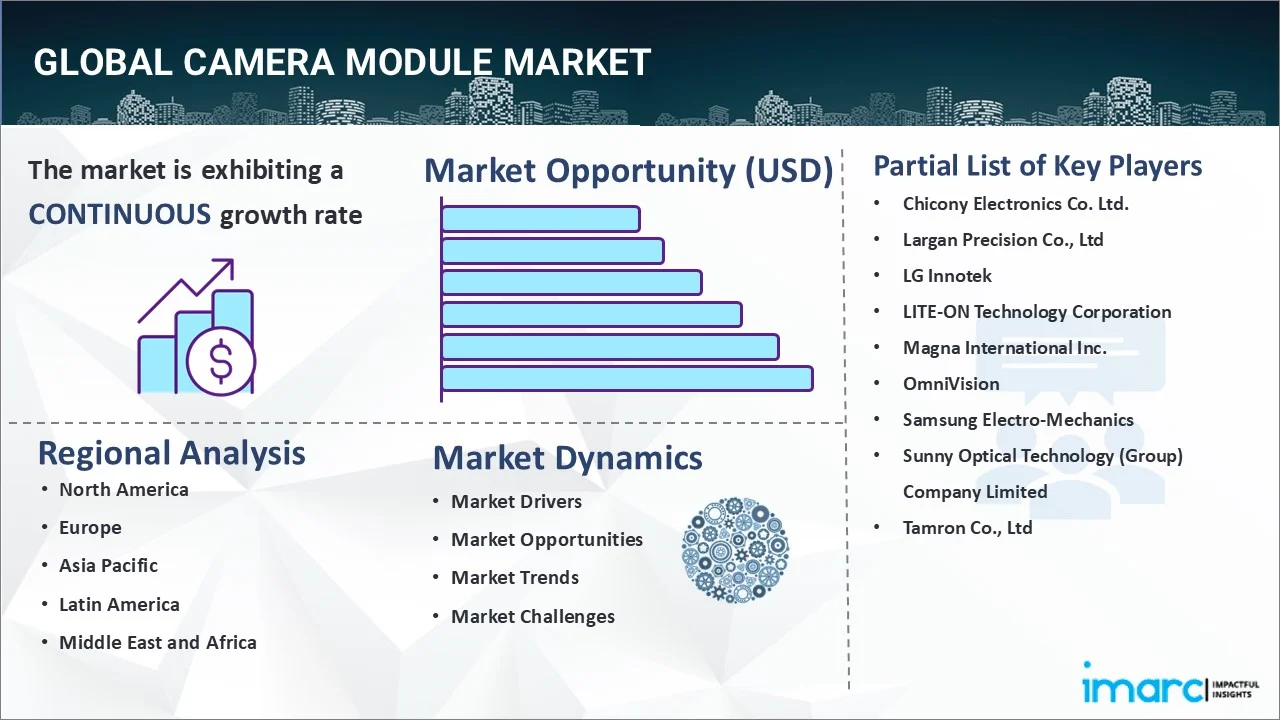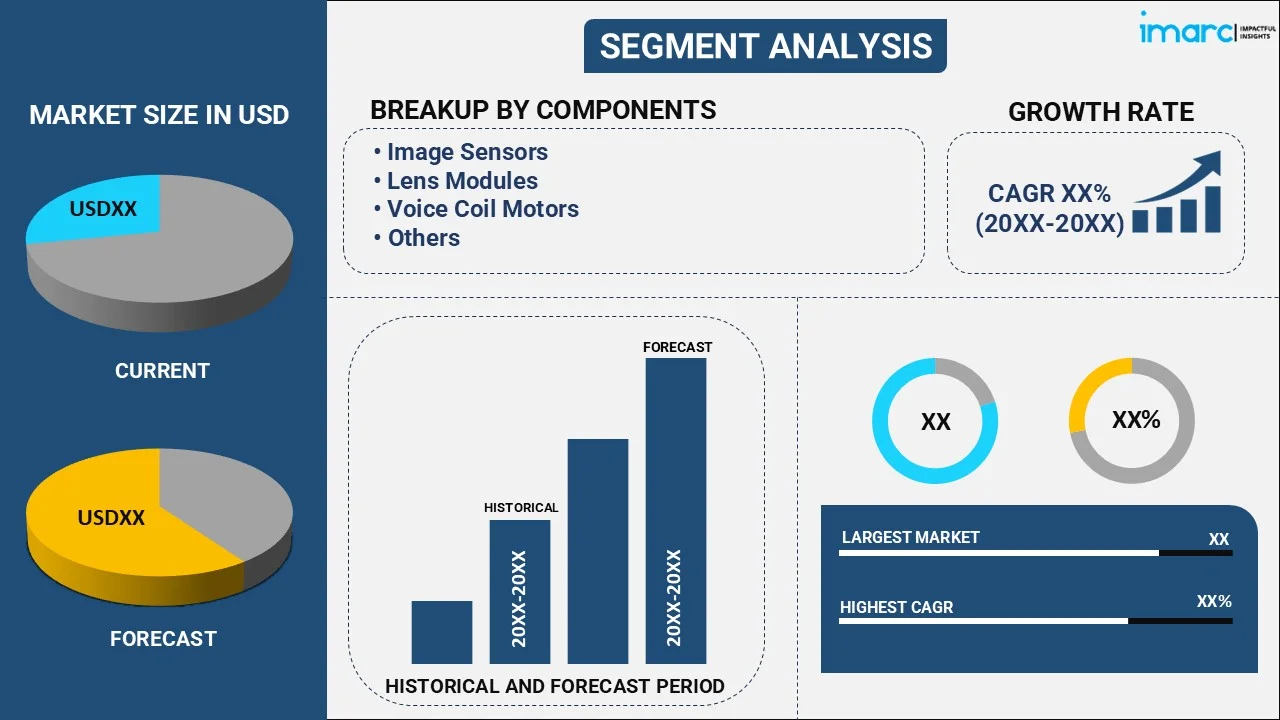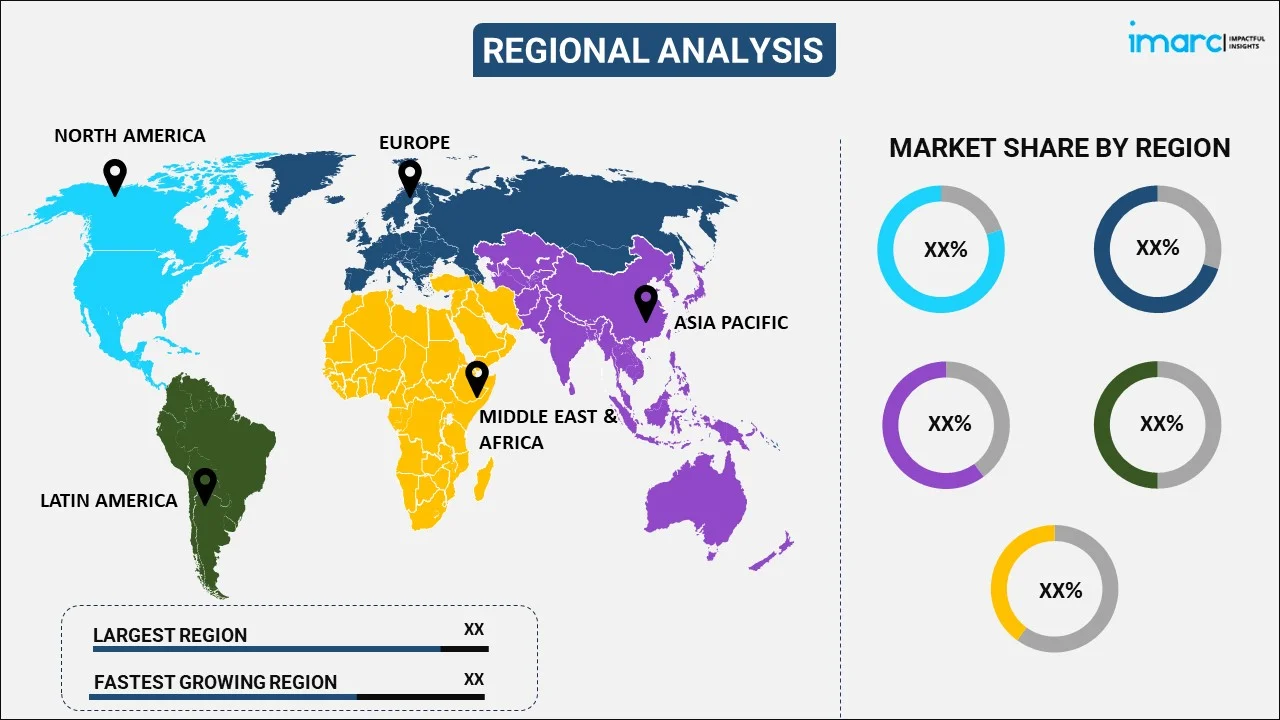
Camera Module Market Report by Component (Image Sensors, Lens Modules, Voice Coil Motors, and Others), Focus Type (Fixed Focus, Autofocus), Interface (Camera Serial Interface, Camera Parallel Interface), Pixels (Up to 7 MP, 8 to 13 MP, Above 13 MP), Process (Flip-Chip Camera Module, Chip-On-Board Camera Module), Application (Consumer Electronics, Automotive, Healthcare, Industrial, Security and Surveillance, Aerospace and Defense), and Region 2025-2033
Market Overview:
The global camera module market size reached USD 46.0 Billion in 2024. Looking forward, IMARC Group expects the market to reach USD 85.9 Billion by 2033, exhibiting a growth rate (CAGR) of 6.83% during 2025-2033.
|
Report Attribute
|
Key Statistics
|
|---|---|
|
Base Year
|
2024
|
|
Forecast Years
|
2025-2033
|
|
Historical Years
|
2019-2024
|
|
Market Size in 2024
|
USD 46.0 Billion |
|
Market Forecast in 2033
|
USD 85.9 Billion |
| Market Growth Rate 2025-2033 | 6.83% |
A camera module is designed to capture photographic or video type images. It forms an integral component of sensor simulation, which validates camera-based assistance and automated driving functions. A camera module involves lens, infrared filter (IR filter), aperture, digital signal processing (DSP), and a soft board, which allows for camera simulation based on the light propagation and measurement of the imager chip. In addition to this, it can be used to extend the functionality of the camera for data processing algorithms and include custom models. As a result, a camera module is being widely used in video conferencing, security systems, and real-time monitoring as a video input device.

To get more information on this market, Request Sample
Camera Module Market Trends:
The increasing demand for consumer electronics represents the key factor driving the global camera module market growth. This can be attributed to its extensive utilization in smartphones, tablets, interior navigation, satellite space imaging, and picture storage. Moreover, the rising awareness regarding the associated benefits of camera module over conventional charged-coupled device (CCD) sensors, such as lower power consumption, faster frame rate, and cost-effectiveness, is catalyzing the market growth. Rapid urbanization and industrialization, particularly in emerging economies, is further facilitating the need for advanced security and surveillance systems. This, in turn, is intensifying the product adoption across smart homes, government buildings, and commercial complexes, thus creating a positive outlook for the market. Other than this, the emergence of unmanned aerial vehicles (UAV) has escalated the demand for high-definition (HD) cameras in the military sector. Besides this, the development of advanced internet technology, improvement of network speed, and the continuous maturity of photographic imaging device technology are projected to drive the market further.
Key Market Segmentation:
IMARC Group provides an analysis of the key trends in each sub-segment of the global camera module market report, along with forecasts at the global, regional and country level from 2025-2033. Our report has categorized the market based on component, focus type, interface, pixels, process and application.
Breakup by Component:

- Image Sensors
- CMOS Image Sensors
- CCD Image Sensors
- Lens Modules
- Voice Coil Motors
- Others
Breakup by Focus Type:
- Fixed Focus
- Autofocus
Breakup by Interface:
- Camera Serial Interface
- Camera Parallel Interface
Breakup by Pixels:
- Up to 7 MP
- 8 to 13 MP
- Above 13 MP
Breakup by Process:
- Flip-Chip Camera Module
- Chip-On-Board Camera Module
Breakup by Application:
- Consumer Electronics
- Automotive
- Healthcare
- Industrial
- Security and Surveillance
- Aerospace and Defense
Breakup by Region:

- North America
- United States
- Canada
- Asia-Pacific
- China
- Japan
- India
- South Korea
- Australia
- Indonesia
- Others
- Europe
- Germany
- France
- United Kingdom
- Italy
- Spain
- Russia
- Others
- Latin America
- Brazil
- Mexico
- Others
- Middle East and Africa
Competitive Landscape:
The report provides a comprehensive analysis of the competitive landscape in the global camera module market with detailed profiles of all major companies, including:
- Chicony Electronics Co. Ltd.
- Largan Precision Co., Ltd
- LG Innotek
- LITE-ON Technology Corporation
- Magna International Inc.
- OmniVision
- Samsung Electro-Mechanics
- Sunny Optical Technology (Group) Company Limited
- Tamron Co., Ltd
Report Coverage:
| Report Features | Details |
|---|---|
| Base Year of the Analysis | 2024 |
| Historical Period | 2019-2024 |
| Forecast Period | 2025-2033 |
| Units | Billion USD |
| Segment Coverage | Component, Focus Type, Interface, Pixels, Process, Application, Region |
| Region Covered | Asia Pacific, Europe, North America, Latin America, Middle East and Africa |
| Countries Covered | United States, Canada, Germany, France, United Kingdom, Italy, Spain, Russia, China, Japan, India, South Korea, Australia, Indonesia, Brazil, Mexico |
| Companies Covered | Chicony Electronics Co. Ltd., Largan Precision Co., Ltd, LG Innotek, LITE-ON Technology Corporation, Magna International Inc., OmniVision, Samsung Electro-Mechanics, Sunny Optical Technology (Group) Company Limited, Tamron Co., Ltd, etc. |
| Customization Scope | 10% Free Customization |
| Post-Sale Analyst Support | 10-12 Weeks |
| Delivery Format | PDF and Excel through Email (We can also provide the editable version of the report in PPT/Word format on special request) |
Key Questions Answered in This Report
The global camera module market was valued at USD 46.0 Billion in 2024.
We expect the global camera module market to exhibit a CAGR of 6.83% during 2025-2033.
The rising consumer awareness towards the numerous associated benefits of camera module, such as lower power consumption, faster frame rate, cost-effectiveness, etc., over conventional charged-coupled device (CCD) sensors is primarily driving the global camera module market.
The sudden outbreak of the COVID-19 pandemic had led to the implementation of stringent lockdown regulations across several nations, resulting in a temporary closure of various manufacturing units for camera modules.
Based on the component, the global camera module market has been segmented into image sensors, lens modules, voice coil motors, and others. Currently, image sensors hold the majority of the total market share.
Based on the focus type, the global camera module market can be divided into fixed focus and autofocus, where fixed focus currently exhibits a clear dominance in the market.
Based on the interface, the global camera module market has been categorized into camera serial interface and camera parallel interface. Currently, camera serial interface accounts for the majority of the total market share.
Based on the application, the global camera module market can be segregated into consumer electronics, automotive, healthcare, industrial, security and surveillance, and aerospace and defense. Among these, the consumer electronics sector exhibits a clear dominance in the market.
On a regional level, the market has been classified into North America, Asia-Pacific, Europe, Latin America, and Middle East and Africa, where Asia-Pacific currently dominates the global market.
Some of the major players in the global camera module market include Chicony Electronics Co. Ltd., Largan Precision Co., Ltd, LG Innotek, LITE-ON Technology Corporation, Magna International Inc., OmniVision, Samsung Electro-Mechanics, Sunny Optical Technology (Group) Company Limited, and Tamron Co., Ltd.
Need more help?
- Speak to our experienced analysts for insights on the current market scenarios.
- Include additional segments and countries to customize the report as per your requirement.
- Gain an unparalleled competitive advantage in your domain by understanding how to utilize the report and positively impacting your operations and revenue.
- For further assistance, please connect with our analysts.
 Request Customization
Request Customization
 Speak to an Analyst
Speak to an Analyst
 Request Brochure
Request Brochure
 Inquire Before Buying
Inquire Before Buying




.webp)




.webp)












